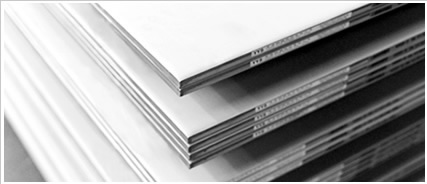

| Nickel Alloy Sheets |
 |
User Industries: Product Range: |
Nickel Alloys : The properties of INCONEL® alloy 601 make it a material of broad utility in such fields as thermal processing, chemical processing, pollution control, aerospace, and power generation. Strength of INCONEL® alloy 625 is derived from the stiffening effect of molybdenum and niobium on its nickel-chromium matrix; thus precipitation-hardening treatments are not required. This combination of elements also is responsible for superior resistance to a wide range of corrosive environments of unusual severity as well as to high-temperature effects such as oxidation and carburization. Incoloy alloy 800, Incoloy alloy 825, Inconel alloy X-750, Inconel alloy 690, Inconel alloy 617, Inconel alloy 718, Incolloy alloy DS Nickel : Nickel 200 The corrosion resistance of Nickel 200 makes it particularly useful for maintaining product purity in the handling of foods, synthetic fibers, and caustic alkalies; and also in structural applications where resistance to corrosion is a prime consideration. Other applications include chemical shipping drums, electrical and electronic parts, aerospace and missile components. , Nickel 201, Nickel 201, LC Nickel 99.2; Alloy 201 Commercially pure (99.6%) wrought nickel essentially the same as Nickel 200 but with a lower carbon content to prevent embrittlement by intergranular carbon at temperatures over 600°F (315°C). Lower carbon content also reduces hardness, making Nickel 201 particularly suitable for cold-formed items. Hastelloy : C-276, C-22, B-2 & B-3, Hastelloy -X Monel 400: (UNS N04400; W.Nr. 2.4360 and 2.4361) is a solid-solution alloy that can be hardened only by cold working. It has high strength and toughness over a wide temperature range and excellent resistance to many corrosive environments. Alloy 400 is widely used in many fields, especially marine and chemical processing. Typical applications are valves and pumps; pump and propeller shafts; marine fixtures and fasteners; electrical and electronic components; springs; chemical processing equipment; gasoline and fresh water tanks; crude petroleum stills, process vessels and piping; boiler feed water heaters and other heat exchangers; and deaerating heaters. Monel K-500 : UNS N05500/ W.Nr. 2.4375) is a nickel-copper alloy which combines the excellent corrosion resistance of MONEL® alloy 400 with the added advantages of greater strength and hardness. The increased properties are obtained by adding aluminum and titanium to the nickel-copper base, and by heating under controlled conditions so that submicroscopic particles of Ni3 (Ti, Al) are precipitated throughout the matrix. The thermal processing used to effect precipitation is commonly called age hardening or aging. Typical applications for Monel® Alloy K-500 products are chains and cables, fasteners and springs for marine service; pump and valve components for chemical processing; doctor blades and scrapers for pulp processing in paper production; oil well drill collars and instruments, pump shafts and impellers, non-magnetic housings, safety lifts and valves for oil and gas production; and sensors and other electronic components. Titanium Alloys : This alloy is produced by primary melting using vacuum arc (VAR), electron beam (EB), or plasma arc hearth melting (PAM). Remelting is achieved by one or two vacuum arc steps. Super Stainless Steel : |
| Contact Us Address: 1116, Floor-11, Plot cs 1487, Prasad Chamber, Tata road no 2, Roxy cinema opera house, Girgaon, Mumbai- 400004 Phone: +91 22 23679777 / +91 22 67437112 Email: info@jaimanmetalloys.com |
|
| Designed & Hosted by : MID Promoted by : GID | Nickel alloy Sheets | Nickel Alloy Round Bars | Seamless Pipes Tubes | Nickel Alloy Flanges |